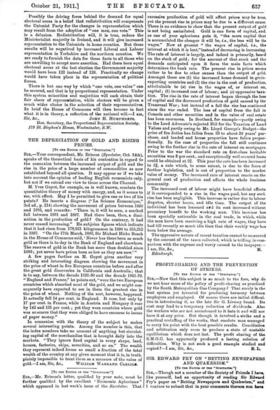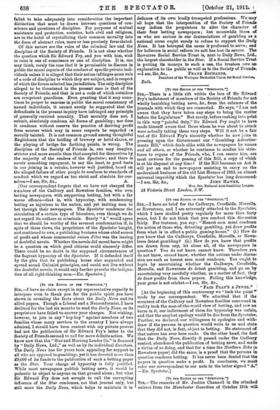SIR EDWARD FRY ON "BETTING NEWSPAPERS AND QUAKERISM."
[To THE EDISON. OF TEl SPICCTATON..1 Sra,—Though not a member of the Society of Friends I hays, like yourself, bad an opportunity of reading Sir Edward Fry's paper on " Betting Newspapers and Quakerism," and I venture to submit that in your comments thereon von have
failed to take adequately into consideration the important distinction that must be drawn between questions of con- science and questions of discipline. For purposes of mutual assistance and protection, societies, both civil and religious, are in the habit of crystallizing their common morality into the form of abstract rules, more or less precisely formulated.
Of this nature are the rules of the criminal law and the discipline of the Society of Friends. It is not clear whether the question which Sir Edward Fry, and you with him, wish to raise is one of conscience or one of discipline. It is, one may think, rarely the case that it is permissible to discuss in public the moral aspects of the conduct of specific private indi- viduals unless it is alleged that their action infringes some rule of a code of discipline to which they are subject, and in respect of which the forum selected has jurisdiction. The only discipline alleged to be threatened in the present case is that of the Society of Friends, and that is not a code of which outsiders are competent guardians. Even granting that it may some- times be proper to canvass in public the moral consistency of named individuals, it cannot surely be suggested that the defendants in the present inquiry have infringed any principle of generally received morality. That morality does not, I submit, absolutely condemn all forms of gambling; nor does it condemn without reserve the practice of deriving profit from sources which may in some respects be regarded r_s morally tainted. It is not common ground among thoughtful Englishmen that the holding of brewery or hotel shares, or the playing of bridge for farthing points, is wrong. The discipline of the Society of Friends is, one may imagine, stricter and more ascetic than that accepted for themselves by the majority of the readers of the Spectator; and there is surely something repugnant, to say the least, to good taste in our joining in a rebuke, however well justified, based on the alleged failure of other people to conform to standards of conduct which we regard as too strict and absolute for our- [Our correspondent forgets that we have not charged the =embers of the Cadbury and Rowntree families, who own betting newspapers, with supporting betting, but with a far worse offence—that is, with hypocrisy, with condemning betting as injurious to the nation, and yet inciting men to bet through their newspapers. The Spectator condemns the circulation of a certain type of literature, even though we do not regard its authors as criminals. Surely "A" would agree that we should be worthy of the severest condemnation if, in spite of these views, the proprietors of the Spectator bought, and continued to own, a publishing business whose chief source of profit and whose commercial raison d'être was the issuing of doubtful novels. Whether the novels did moral harm might be a question on which good citizens could sincerely differ. There could be no doubt in the supposed circumstances of the flagrant hypocrisy of the Spectator. If it defended itself by the plea that its publishing house also supported and spread sound Unionist principles, and could not live without the doubtful novels, it would only further provoke the indigna- tion of all right-thinking men.—En. Spectator.]















































 Previous page
Previous page